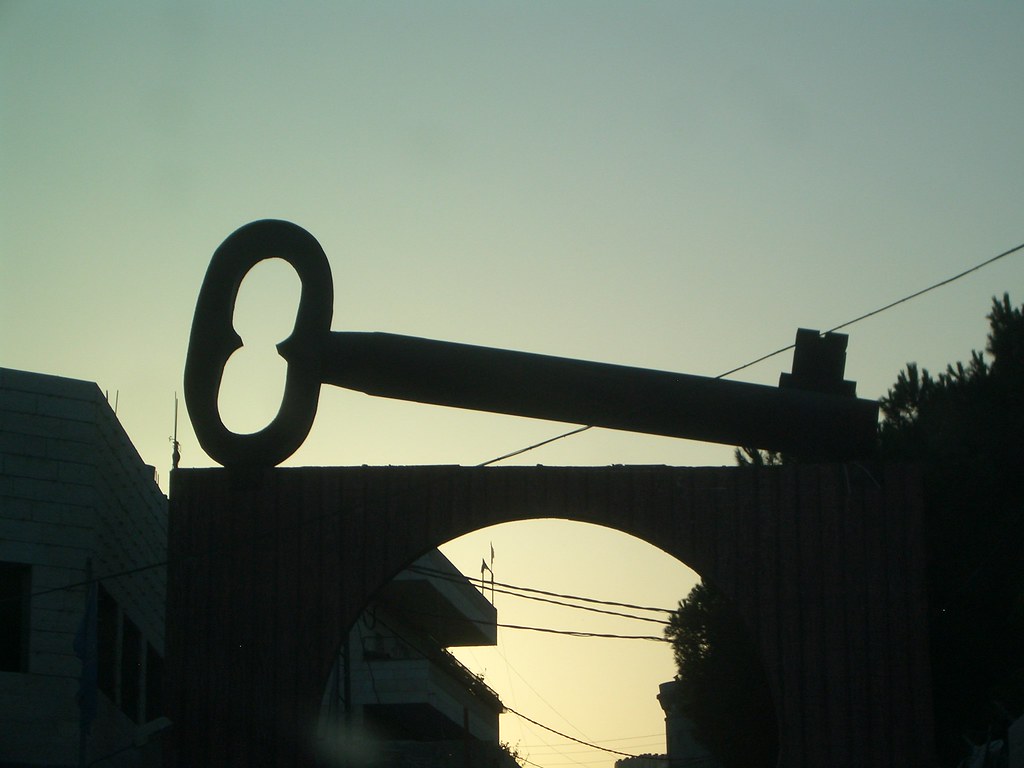The key is a symbol of the Right of Return of Palestinians to the homes they were forced to leave in 1948.
I’m fourteen years old and I’m Palestinian. These are facts. My grandparents were all born in Palestine when it was still under the British mandate. That’s also a fact. Two of them were born in Acre and one of them was born in Haifa, former Palestinian cities that became major Israeli cities due to the UN 181 resolution that partioned Palestine into two states in 1947. Another fact. My mom’s dad is from Jenin, a city which, according to international law and numerous UN resolutions, is part of the Palestinian territories occupied by Israel in 1967. Yet another fact.
I don’t know who now lives in my grandparents’ houses from my dad’s side in Acre. However, in my grandmother’s house in Haifa, the house built by my great grandfather and the one she and her family were forced to leave in 1948 when she was 12 years old, there lives a Jewish family of Polish descent. That’s a fact. By a miracle of fate, their grandparents survived the horrors of the Holocaust, and barely made it to Palestine. That’s also a fact. The children of these survivors were born in that house and have now created a family of their own under that roof, a family that knows no other home. Another fact.
Because I am Palestinian, I cannot go visit, let alone live in Haifa or Acre, the cities where my grandparents, their parents, grandparents and ancestors were born and lived for two thousand years.That is a fact. My classmates can go visit Haifa and Acre any time, and my Jewish classmates can go live there simply because their ancestors lived there two thousand years ago. That is also a fact. The Law of Return is an Israeli law, passed in 1950, which grants Jews the right to come live in Haifa, for example, and gain Israeli citizenship. Meanwhile, Palestinians born and raised in Haifa are denied that same right. In addition, Israeli laws such as the Legal and Administrative Matters Law of 1970, exclusively allows Israeli Jews to file claims over property which they owned prior to 1948 in East Jerusalem, but deny Palestinians that same right to their pre1948 owned homes in Haifa, Acre, Jaffa, Nazareth, etc…
My grandparents’ story is not a solitary one but the story of 750,000 Palestinians out of a population of 1.9 million that were expelled from their towns and villages in 1948 to make way for new Jewish immigrants. My story as a descendant of the people from the Nakba (the word used to describe the expulsion of Palestinians from their homeland and the Arabic word for catastrophe) is not singular either. Approximately 7 million Palestinians are living in the diaspora today, unable to return to their land, still passing on from generation to generation the keys to houses that continue to stand today. I cannot pretend to be unbiased, because I clearly am. I cannot pretend to find a clear solution in an article of less than 1000 words, when several generations of politicians have failed to do so in thousands of documents. What I can do is raise a few key questions that will allow me and others to reflect.
The purpose of this article is not to raise the question of who has historical ownership over the land, but rather to shed light over the double standard that exists today. Why do some have the right of return while others don’t? What are the qualifications needed in order to prove one has the right to return to one’s own house? According to international law, it is illegal to deny people of a particular race, color, national or ethnic origin the right to return to their homes. This is also provided for in the Universal Declaration of Human Rights (Article 13), in major treaties protecting the rights of refugees in times of armed conflicts, and consistently referred to in UN resolutions. This raises the following question: Are there countries that are above international law? If so, why does international law even exist?
There is a double standard when it comes to viewing the question of Palestine and Israel. For that reason I would like the readers of this article to ponder upon the query of how they would feel if the roles in this conflict were reversed? Only by being able to share and understand the feelings of one another, i.e. through empathy, can we hope to solve these crucial questions.
Bibliography:
Badham, Bill. The Right to Return. 8 Sept. 2010. Entrance to Aida Refugee Camp, Bethlehem.

